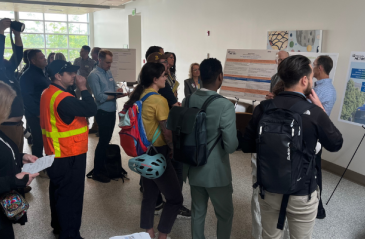
The information barriers holding back climate action and how to break them

We put our vision for government into practice through learning partner projects that align with our values and help reimagine government so that it works for everyone.
This keynote speech was given at the Pre Davos Summit 2017 of the WEF Global Shapers Community
It doesn't matter what kind of government you believe in - big government, small government, medium government - you ought to care about the effectiveness of government, about how government achieves the outcomes that its citizens want and deserve.
Government has an enormous impact on our lives. The difference between an effective and an ineffective government could not be bigger. A effective, competent government will allow you, your children and your friends to lead happy, healthy and free lives.
An incompetent, ineffective government makes our lives miserable. It denies you your dreams, aspirations and freedoms.
I'd like to leave you at the end with three things:
- I want to leave you with a heuristic for thinking about impact in government in a general way. In fact, I believe that this heuristic is so useful that I want you to use it yourself, if you're in government. Or, if you don't work in government, I'd like you to tell all your friends who work in government about it.
- I also want to give you an idea why Artificial Intelligence will completely transform the ability of government to get things done.
- Finally, I would like to convince you that this change is not just coming, but that governments have a moral obligation to make the best use of Artificial Intelligence.
I'll start with the heuristic, not just because it's important on its own, but because it will help us think through the impact of Artificial Intelligence on governments more clearly.
Given how important governments are to our lives it is surprising that there exists no particularly good theory of why some policies fail while others succeed.
About a year ago my colleagues and I set out to change that. We examined more than 200 cases of government action from around the world, we spoke in depth with civil servants and politicians and we validated everything with practitioners and a group of leading academics.
What we found time and time again were three things: you need a well designed policy, you need sufficient underlying support for what you're trying to achieve and you need action to translate that policy into real-world effect.
We call these three - policy, legitimacy, action - the Fundamentals, because they are essential to getting anything done in government.
You can have the most well thought out policy and overwhelming support for it, if you don't have a mechanism to translate this into real-world effects it's all for naught.
You can also great legitimacy and an excellent mechanism to deliver the policy - but if the policy itself is flawed you won't achieve anything.
Everything you'll hear today, tomorrow or indeed in Davos will not work without a well-designed policy, without sufficient legitimacy and without action that translates ideas to outcomes.
And given what has been happening over the past few months it feels obvious that we have some work to do on the Legitimacy dimension… and I posit that that is because we have been paying too much attention to policy and action, and not enough to legitimacy. - and we'll get back to that.
It is not very often that a technology comes along which promises to upend many of our assumptions about what government can and cannot achieve.
If you've been reading anything really in the past few months it has been difficult to avoid Artificial Intelligence. It suddenly seems everywhere.
Three years ago every start-up had exactly one business model: "Uber for X" ("Uber for cat food", "Uber for medical marijuana", "Uber for dog-walking"). - I promise, I only made up one of these three.
Now, the model is different and it's "X plus Artificial Intelligence".
To be fair, some of this is hype, no doubt. But the underlying development is real. And the speed at which has been happening is staggering.
Nick Bostrom, an academic at Oxford, is one of the most bullish people on Artificial Intelligence. In 2014 he was convinced that it would take computers another 10 years before they would beat humans at Go. Go is a famously complex board game and it is order of magnitude more complex than chess.
In March last year one of the world's strongest Go players (Lee Sedol) accepted to play against an Artificial Intelligence program called AlphaGo. As you might remember he was confident that he would win. As you might also remember AlphaGo didn't just do well, it mopped the floor with Lee Sedol. It defeated him decisively.
And it didn't just defeat him, but it found moves and strategies that were completely new to the humans who had spent their lives mastering the game.
Algorithms are already outperforming humans on tasks that matter in a more immediate way. Artificial Intelligence for instance beats human pathologists at predicting patient survival times for certain kinds of cancerous tumors.
You may have also heard of Fokoku Mutual Life Insurance, a Japanese insurance firm. Until last week they had 34 employees who calculated insurance payouts, now they have no employees who calculate insurance payouts. Instead they have an Artificial Intelligence system which does the same, costs less and is expected to do a better job than the humans.
All of this of course raises many questions and fears, as you all are well aware.
Much of the conversation in the public and also in policy circles is about the impact of Artificial Intelligence on society. What does the future of work look like? And how should we regulate things such as self-driving cars or price-setting algorithms?
These are important questions, to be sure. But surprisingly little effort has gone into understanding how Artificial Intelligence will transform government itself.
You can think of almost any (reasonably functional) government as doing essentially three things: operations, service delivery and policymaking.
- first it has an "operations" function - in many ways a government is an organisation like any other. This means that someone needs to take care of Human Resources, someone needs to make sure all the lights are on, make sure your office is neither too hot nor too cold, and all the rest of it.
- secondly, it has a "service delivery" function - this is the provision of services such as unemployment counseling, benefits, social services, education, food safety inspections, street cleaning, etc.
- lastly, we have some part of government that thinks about "policy" - the strategic questions of what a government's priorities are and how it goes about achieving those
For the "operations" piece it is relatively easy to predict what AI will do to it. These functions naturally lend themselves to automation and there is no difference between processing the payroll for a grocery chain versus processing the payroll for a local school. Government will be able to benefit from the inevitable advances AI will deliver here.
Is service delivery any different?
Much of it is based on humans doing their very best to assess a situation right and act accordingly. Think of unemployment counselor. If you are unemployed and go to a job center you will meet a job counselor who will use his or her well-honed professional judgment to help you find a job.
When you walk in the counselor will likely do at least three things with you:
- check your eligibility for benefits
- assessing your profile and job history
- identifying the best workshops or trainings that will help you find a job fast
It turns out that Artificial Intelligence systems are naturally good at doing all of these things. A machine can simply process more data and detect more subtle relationship than a human ever could.
An AI system, or possibly an AI supported by a counselor, would outperform a human.
The same logic holds for an untold number of other government services.
This is not just neat, but it really matters.
It deeply matters whether a job counselor gives you good advice, it matters whether a physician detects your parent's cancer early enough, it matters if social workers can identify children in troubled families before they are harmed.
If we have a new way to provide better services to the citizens that need them then every government has a moral obligation to make full use of it.
Out of the three things that government does - operations, service delivery and policymaking - so far two show a huge potential for AI.
What about policymaking?
Let me give you an interesting example.
In Japan, like in many other countries, civil servants spend an enormous amount of time compiling answers to questions from elected representatives.
In two weeks from now, The Ministry for Economy, Trade and Industry will introduce an artificial intelligence system which will help its civil servants draft answers to such questions.
Just yesterday I spoke to the finance director of a local district in London. On many days he spends 60% of his time not on managing the borough's finances, but pulling together answers to exactly these kinds of questions.
Imagine how liberating it would be if you had a machine draft these for you!
It looks like AI can make a difference across all spheres of government.
But: the machine will not just figure it out for us.
Artificial Intelligence is the ideal technology to support government in formulating policies. It is also ideally suited to deliver against those policies. And, in fact, if done properly policy and action will become indistinguishable.
Legitimacy is the domain where we need to do a lot of work.
The problem is:
Machine intelligence doesn't exist in some sort of normative vacuum. We endow algorithms and AI with our values, but also with our biases. There is a risk that if we are not careful we will end up building a system that is enormously powerful and perpetuates existing problems.
We will also have to rethink some of our existing accountability mechanisms. All accountability mechanisms we currently have ultimately rest on the fact that we can do violence to a human in order to punish. We can put a grossly negligent case worker in jail. We cannot do that with an algorithm.
But AI also brings an enormous opportunity. For the first time we have the chance to properly examine decisions and systematically eliminate bias and discrimination in government.
AI can also strengthen democracy in a different way. Our democratic institutions are built to adjudicate normative questions for which there are no empirical answers.
And yet our democratic institutions are often busy debating questions which - if we wanted - we could find an empirical answer to. You could imagine a situation in which our democratic institutions and our elected representatives focus on defining where we want to go as a society and focus on how we wish to get there. We then leave it to machine intelligence to show us the best way there.
Making full use of AI in government will have a number of consequences. I want to highlight just three:
First, if we want to reap the benefits we have to allow government to make full use of the data it already holds.
Some countries are more worried about this than others. But they too may change their minds once other governments start mercilessly outperforming them - at a fraction of the tax burden.
Secondly, organizing a government around distinct departments will become obsolete. Most of the difficult problems government is faced with already now don't align with neat departmental boundaries and AI systems will only be truly useful if we build them to solve problems, rather than to conform to arbitrary organisational units.
Finally, government's interactions with citizens will become infinitely more personalized and tailored. Government will understand more about citizens than at any previous point in time.
This gives us new ways to govern ourselves and new ways to achieve our collective goals.
But of course also gives governments terrifying new ways to coerce.
The jury is out on which way this will go.
The machine will not just figure this out for us, which is why we need to figure it out first, before it all ends in tears. But if we get this right the amount of progress can be enormous.
I'm hopeful that in a few years from now we will think of a government which refuses to use AI the same way we would today think of a government which insisted on using type writers and clay tablets.
Finally, I want to let you in on a secret. If you liked what you've just read message me and I'll introduce you to the algorithm that wrote all of this.












